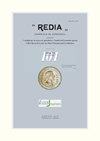FUNGI OBTAINED FROM OLIVE TWIG DIEBACK AND ADULTS OF THE ALIEN PEST XYLOSANDRUS COMPACTUS (EICHHOFF) (COLEOPTERA CURCULIONIDAE SCOLYTINAE)
IF 0.6
4区 生物学
Q3 ZOOLOGY
引用次数: 0
Abstract
Olive (Olea europaea L.) is a traditional crop of great socioeconomic importance in the Mediterranean Basin. In 2021, a survey was performed in an Italian nursery located in Central Italy where unusual symptoms and widespread dieback had been observed on young potted olive trees. Twigs and branches of all plants affected by dryness showed the presence of the alien bark beetle Xylosandrus compactus. Woody tissues colonized by X. compactus were transferred into the laboratory and several fungi such as Cladosporium perangustum and Neofusicoccum parvum were then identified. In addition to these species, Geosmithia pallida was also reported for the first time in Italy on this plant. Studies on this bark beetle and its associated fungi are currently in progress to further evaluate potential risks for olive cultivation. Key Words: Olea europea, fungi, bark beetles.从橄榄枝枯死和外来害虫紧密木(EICHHOFF)成虫中获得的真菌
橄榄(Olea europaea L.)是地中海盆地具有重要社会经济意义的传统作物。2021年,在位于意大利中部的意大利苗圃进行了一项调查,在盆栽橄榄树上观察到不寻常的症状和广泛的枯死。所有受干燥影响的植物的小枝和树枝上都有外来树皮甲虫Xylosandrus compactus的存在。将被压实葡萄定植的木质组织转移到实验室,鉴定出了几种真菌,如枝孢菌(Cladosporium perangustum)和新真菌(Neofusicoccum parvum)。除上述种外,在意大利也首次报道有苍白地藓属(Geosmithia pallida)。目前对这种树皮甲虫及其相关真菌的研究正在进行中,以进一步评估橄榄种植的潜在风险。关键词:油橄榄;真菌;树皮甲虫;
本文章由计算机程序翻译,如有差异,请以英文原文为准。
求助全文
约1分钟内获得全文
求助全文
来源期刊

Redia-Giornale Di Zoologia
ZOOLOGY-
CiteScore
1.20
自引率
20.00%
发文量
18
审稿时长
>12 weeks
期刊介绍:
Redia supports its long history of basic and applied research in entomology and invertebrate zoology in the field of crop and forest tree protection responding at the same time to the increasing need of innovation and technological improvement.
 求助内容:
求助内容: 应助结果提醒方式:
应助结果提醒方式:


